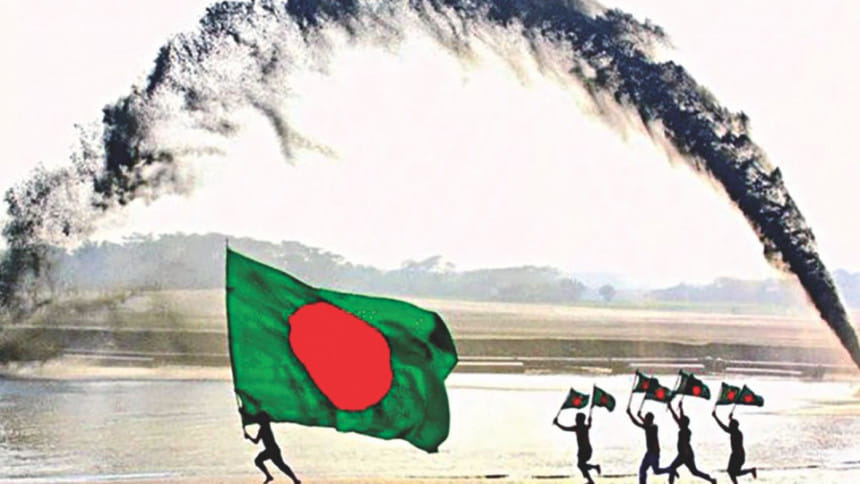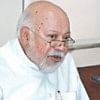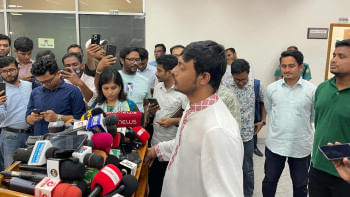Bangladesh's travails: A relentless saga

Despite our numerous achievements in domestic and international spheres, the following refrain has refused to go away in the last several decades: "why is Bangladesh so bitterly divided as a polity? Why are Bangladesh's political leaders so totally consumed by their personal animosities towards each other that they neglect good governance of the state? Why does Bangladesh, having rejected political Islam as the governing logic for state formation, still appear to be dangerously courting apparent Islamisation of the State? Why is respect for rule of law and human rights so abysmally absent?" These persisting questions, repeated even today despite all attempts at rationalisation, overwhelm one with an oppressive sense of déjà vu.
At the heart of our malaise lies the inescapable fact that after having asserted our Bangalee ethnicity and culture as the defining paradigm of our nationhood in 1971, one that embraced Bangalee Muslims as well as Bangalee non-Muslims equally, equitably and unequivocally we forsook it less than five years later. Having emerged as the only homogenous nation-state in the partitioned subcontinent, we had overwhelmingly embraced secular ideals, social justice and pluralist democracy as foundations of nationhood. But then, less than five years later, we inexorably and tragically, mutated into redefining ourselves within a politically contrived but hyphenated identity as Bangalee-Muslims instead of "Bangalees". In doing so, we effectively stooped to privileging the Muslim Bangalees above non-Muslim Bangalees, thereby relegating the latter, by implication if not by law, into second-class citizenship. All religions strive to promote righteousness. But when, for political convenience, a majoritarian community starts aggressively projecting its self-righteousness above all and seeks to compel others to conform, it transgresses a red line and strays into very murky territory that is defined by intolerance and contemptuous rejection of "the other". This mutation struck at the very heart of our secular pluralism and inclusiveness, pushing our democratic aspirations down a treacherously slippery slope.
If we should glean any three important lessons from our experience of the last quarter century, they must surely be these: our great capacity to innovate good things also gives us the disingenuous capability to undermine those very same positive achievements; the mere holding of elections do not necessarily translate into an affirmation of democratic principles and good governance nor offering a panacea for all our ills; and that, indeed, we need to address the fundamental malaise that festers within our body politic if we are to reconcile the differences that divide us and heal the wounds that are still much too raw for the nation. The consolidation of a truly pluralist, inclusive secular democracy, anywhere, is a constant and unending work in progress within an organically evolutionary process. Indeed, these are all lessons that we should have learnt well and absorbed by now.
For securing the future, we need to reassure and bolster in public perception a sense of over-riding confidence that core institutions that underpin the state are indeed secure and fire-walled against any political tampering. The separation of the "judiciary", making it totally independent of the executive branch at all tiers of the justice system is a sine qua non for ensuring that the rule of law prevails in the state and that "justice" acts truly with its eyes blindfolded against partiality towards anyone. So must we also uphold and safeguard the independence and integrity of the Election Commission and the Anti-Corruption Commission. We must resolutely address the malaise that plagues the bureaucracy and prevents it from acting professionally and neutrally, diminishing its capacity to deliver effectively: by freeing it from being hostage to the whims and caprices of any partisan politics that seek to use it as a tool for advancing their own narrow, self-promoting agenda. Civil servants must rediscover the lost creed that should define any bureaucracy: "To take decisions, justly and honestly, without fear or favour". Coupled with this, the freedom and independence of the print and electronic media must be guaranteed. A truly objective media serves the function of being, informally, ombudsman to the nation and keeper of its conscience; in its turn, the media must also demonstrate that it is responsible, neutral and committed to bringing to public domain the unvarnished truth. Above all, leadership, across political divide, need to take constructive criticism in their stride.
Having posited the above, I must also state that much commendable progress has been achieved towards achieving many of these ends in the last decade. The government can justifiably take credit for its many achievements: for putting in place the Right to Information Act that we had lacked for so long, for creating the enabling environment that led the higher judiciary to step forward commendably to adding to the body of law and the edifice of justice, by handing down bold judgments on the fundamentals of our pristine Constitution as well as by bringing perpetrators of crimes against humanity to justice. I must credit the government for having done a lot towards ensuring the viability of these core institutions.
Today we are witnessing a veritable tsunami of insurgency buffeting most countries across the world. The dynamics of this force are essentially driven by a significantly large and critical mass of people, typically between the ages of 18-40, characterised by great impatience and irreverence, demonstrating robustly prodigious disaffection with ossified institutions and entrenched political leaders. Establishments are perceived as being stubbornly immune and frustratingly resistant to change, while political leadership, across a broad spectrum, is perceived as preserving those outmoded institutions that are no longer in sync with the aspirations of this "Now Generation", solely for self-aggrandisement at the expense of people's welfare. No country, not even Bangladesh, is likely to remain unaffected by this global tsunami of discontent. Our leaders would do well to heed it seriously.
Institutions are established by men, and tend to remain static over time. But people are not static. They constantly change. Every successive generation brings to bear new perceptions, new ideas and new aspirations, often jettisoning and completely redefining past perceptions and mores, and aspiring to new goals. For ensuring that the foundations of the state remain intrinsically strong and sufficiently flexible to keep pace with the changing perceptions of successive generations, all core institutions need sustained tending to, updating and strengthening, with policymakers conscientiously engaging in constant self-introspection and re-evaluation. Only thus do the most visionary of politicians graduate to statesmanship. Bear in mind the following exhortation, penned by a towering Statesman (deliberate capitalisation) of our times, Nelson Rolihlahla Mandela (1918-2013), in his classic autobiography Long Walk to Freedom:
"It is better to lead from behind and to put others in front, especially when you celebrate victory when nice things occur. You take the front line when there is danger. Then people will appreciate your leadership".
We Bangladeshis have proved ourselves to be a nation of innovators who have, unitedly, boldly faced and overcome many challenges. This time too, if we can innovate and unite, rising above personal and petty differences, we shall surely overcome—again.
Tariq Karim, a former career diplomat and academic, is currently Visiting Fellow at BRAC University.





Comments